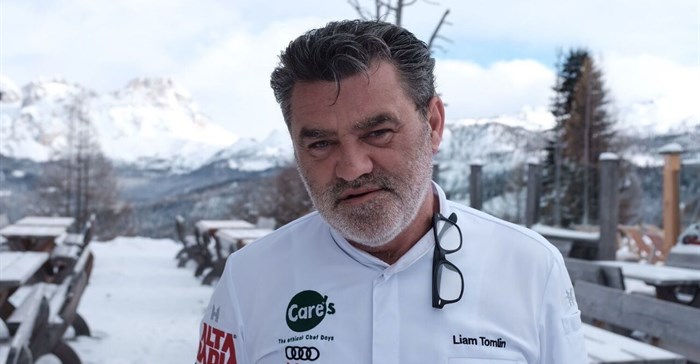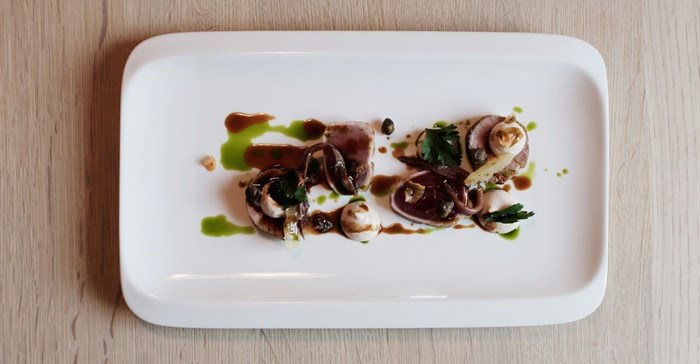
Related
Top stories




Marketing & MediaWarner Bros. was “nice to have” but not at any price, says Netflix
Karabo Ledwaba 1 day


More news

Logistics & Transport
Maersk reroutes sailings around Africa amid Red Sea constraints

















“Having experienced one of my young chefs getting into the finals of the S. Pellegrino Young Chef awards in 2015 and seeing what an amazing experience he had, and lifelong friendships that he has made, I think S. Pellegrino and Acqua Panna do a great job within the food and chef industry. It also exposes us all to the amazing young talent that there is around the world and shows that our industry is going to be in good hands for generations to come,” said Tomlin.
“I was so happy and proud to be picked as the Eat Out S.Pellegrino and Acqua Panna Chef of the Year, especially from the talent that we have here in South Africa. I have our whole team to thank for this award, this award only comes about with the hard work and consistency of everybody who works with us in our four restaurants, Chefs Warehouse & Canteen, Chefs Warehouse at Beau Constantia and recently opened Maison and Thali. Our main focus at all venues is to continue to deliver a consistently good product and good value in all of our establishments.”
Care’s is a globally attended event that has become synonymous with ethics and sustainability. The third annual event was attended by such food luminaries as Oscar Farinetti, founder and creator of Eataly and FICO, Stefania Lallai of Costa Cruises and Lara Gilmore of Food for Soul. These guests starred alongside the chef from Maido, winner of Latin America's 50 Best Restaurants and James P. McMahon and Matt Orlando, all of whom are committed to cutting food waste through their own restaurants and projects.
Following the success of the previous two editions in Alta Badia and Salina, Care’s expanded its 2018 presence with the attendance of 35 international chefs from 14 countries and four continents, gastronomy professionals, journalists and entrepreneurs – all sensitive to ethical issues. An exchange of opinions about sustainability, territory development, environmental protection and, above all, ethics provided an interesting opportunity for training and education for these guests over the three days of events.
Through a continuously growing wave of ethical awareness, Norbert Niederkofler, creator of the event, together with Paolo Ferretti, also a leading voice of the “no-waste” concept, re-confirms his belief which includes that of the ancient customs which taught to recycle ingredients and leftovers.

A staggering one-third of all food remains unused because of the excessive overuse by humans around the world. This, when one considers global poverty and related nutrition issues, is unforgivable. Thus there is one important task that these chefs want to impart to consumers around the world: to educate the young (beginning with the chefs and those in food-related industries) to always be more sensitive and ethically contemporary in personal choices. All good habits begin at home, and this is a perfect example of that.
Care’s Talks took place each day during the festival and was moderated by Lisa Casali, an environmental scientist, blogger, writer, and one of the leaders in Italy when it comes to fighting against waste. Speakers included Farinetti, Gadda with the namesake law nr. 166 against food waste, which has just entered into force; Gilmore with the outstanding project “Refettorio Ambrosiano” now ready to go around the world; Lallai, and Marco Lucchini, secretary general of the Fondazione Banco Alimentare. These speakers, thanks to a prior collaboration, have already been able to transform the massive excess of food from cruise ships into charitable donations, disembarking it for the consumption in the next port, an initiative that is already having an impact around the world on many PDI communities.
Jan Hendrik van der Westhuizen, a South-African chef working in France was also part of the talks. He has already internalised practices in his own kitchen such as the use of seasonal and local ingredients (like the South African herb, buchu) united with practices that aim at saving water resources. Something that is of particular interest to the South African food market in light of serious droughts currently being experienced.
When questioned about his venues in South Africa’s sustainability practices, Tomlin said: “The way that our menus are set up, we have absolutely no food wastage in any of our kitchens. For me, the biggest problem worldwide is food wastage - not only in the restaurant industry but especially in the retail sector. We are also very fortunate at two of our restaurants that we have large vegetable gardens, so we are producing as much as possible of our own fruit, vegetables and herbs. Our menus are all seasonal, using local growers and suppliers as much as possible. Our biggest concern at the moment is our water shortage in The Western Cape. Obviously, in all our restaurants we have implemented water saving initiatives.”
The Care’s Awards Dinner took place on 16 January 2018, at 2,478 meters above sea level, in the mountain shelter Luigi Gorza – Portavescovo at Arabba. These establish the commitment of Care’s towards young generations and those who daily distinguish themselves for their social and ethical engagement in professional life.
• Lorenzo Vecchia from Pozzuolo Martesana – Young Ethical Chef Award sponsored by Monograno Felicetti
• Lorenzo Chiarugi – The Young Ethical Hospitality Award, sponsored by Ferrari Trento
• Giacomo Perletti and Matteo Trapletti – awarded the Social Responsibility Award
The trophies, made by Vetroricerca, a smelter in Bolzano, were created in line with the ethical style of Care’s; made out of waste material from bottles of beer, wine and sparkling wines, which were melted and cut in order to generate sculptures. “From glass there originates glass” is a slogan close to the values of Care's – encouraging recycling and environmental sustainability.
Niederkofler stressed several times that in order to create an ethical and sustainable cuisine, it is necessary to respect some crucial guidelines and the philosophy of producers because, at the centre of each choice, there is the person with their actions.